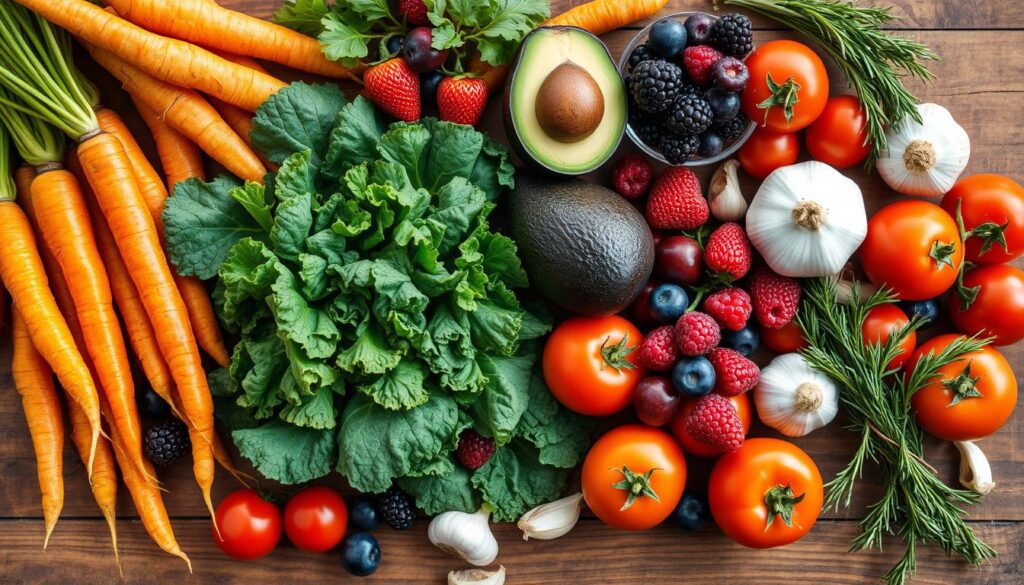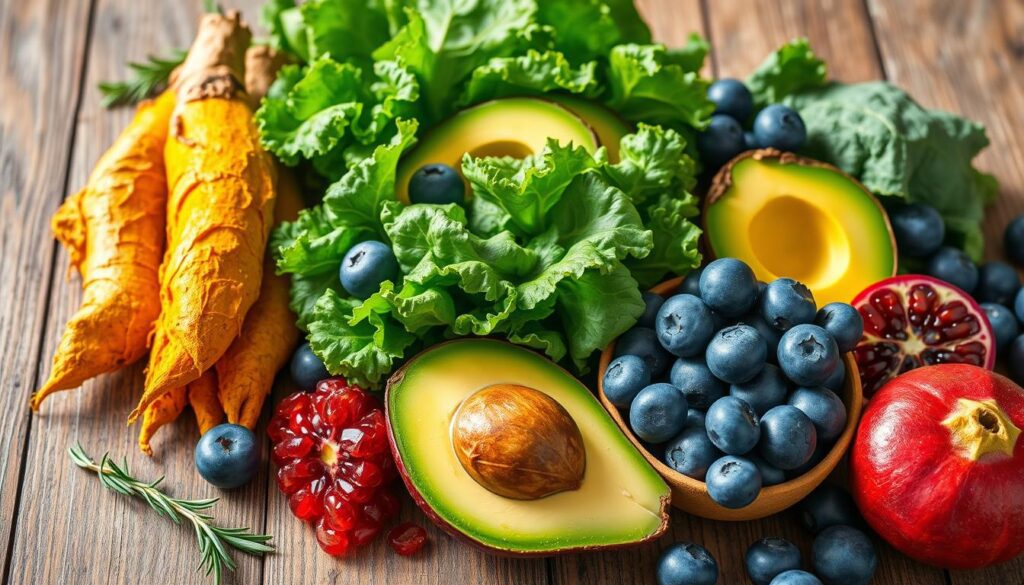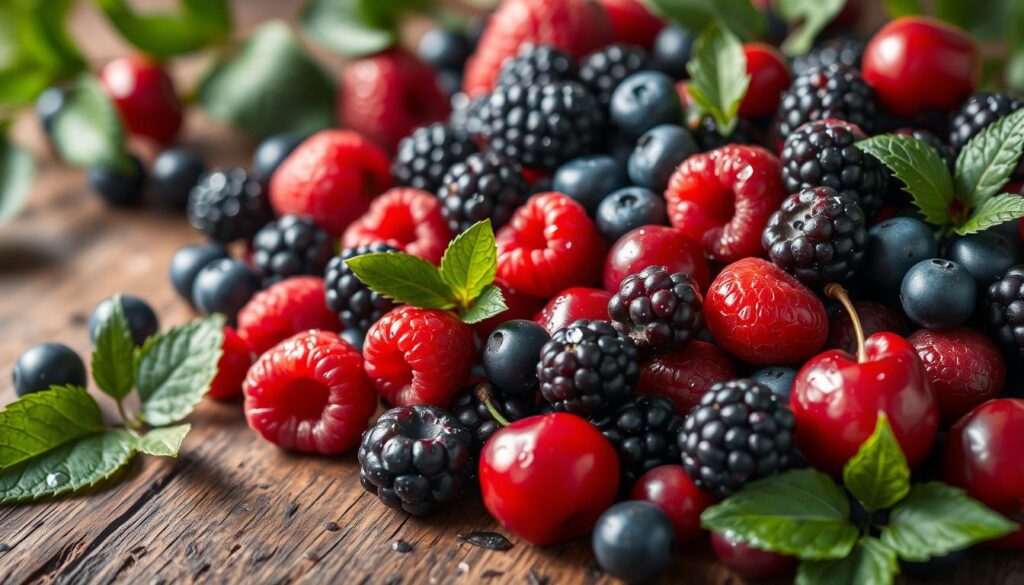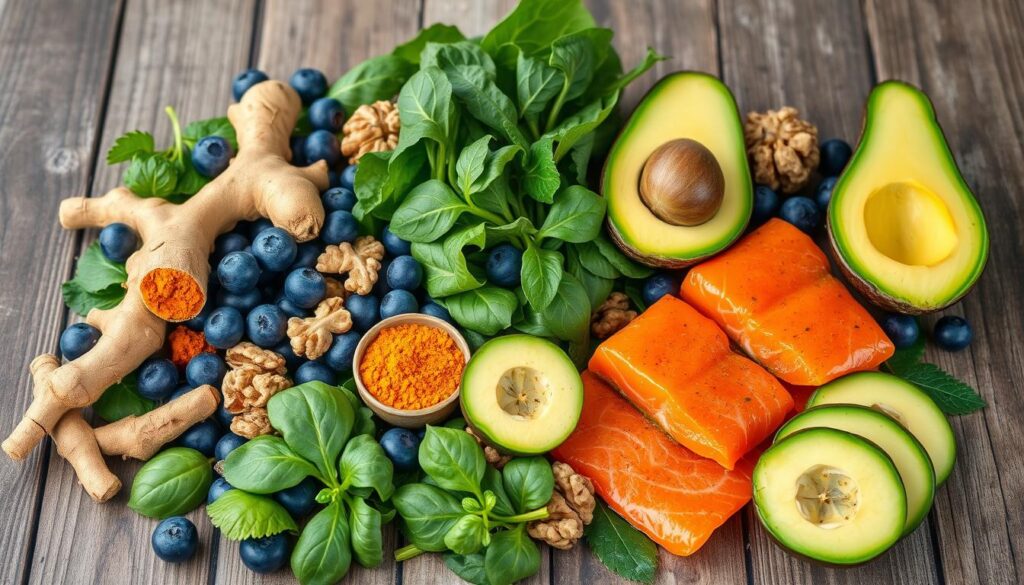Table of Contents
Did you know some foods can cut inflammation by up to 30% with just one serving? Chronic inflammation is a silent threat, linked to serious health issues like heart disease and cancer. But, eating anti-inflammatory foods can help you take charge of your health and feel better daily.

In this guide, we’ll look at 17 anti-inflammatory foods that can boost your wellbeing. From berries and leafy greens to healthy fats and spices, these foods fight inflammation and boost your immune system. Get ready to eat smart and feel your best.
Understanding Inflammation and Its Impact on Health
Inflammation is a natural body response to injury, infection, or illness. It helps the immune system fight off harmful stimuli and start healing. But, chronic inflammation can cause many health problems.
Acute vs. Chronic Inflammation
Acute inflammation is short-term, lasting a few days or weeks. It’s the body’s quick response to threats like cuts or infections. This kind of inflammation is good as it aids in healing.
Chronic inflammation, however, lasts long and is linked to diseases and unhealthy lifestyles. It’s often seen in autoimmune disorders, obesity, and poor diet and exercise.
How Diet Affects Inflammation
The foods we eat greatly affect our body’s inflammation levels. Eating foods that fight chronic inflammation, like fruits, veggies, whole grains, and healthy fats, can reduce it. On the other hand, a diet full of processed foods and unhealthy fats can increase chronic inflammation.
Signs of Chronic Inflammation
Chronic inflammation shows in many ways, like constant fatigue, joint pain, and skin issues. It also raises the risk of serious diseases, such as heart disease and cancer. Knowing the signs is key to managing it through diet and lifestyle changes.

| Inflammatory Marker | Group-by-Time Interaction | P-value |
|---|---|---|
| gp130 | F = 7.07 | p = 0.011 |
| IL-6R alpha | F = 10.33 | p = 0.003 |
| TNF_RI | F = 10.92 | p = 0.002 |
A study by River Budau et al. showed miso’s benefits against inflammation in the small intestine. Miso, a fermented soy product, boosts short-chain fatty acids and improves glucose tolerance in mice on a Western diet. It also increases mucus and anti-inflammatory IL-22, while lowering pro-inflammatory TNF-α and IL-1β.
“The study demonstrated that the number of ILC3s is not the main factor in immune regulation but rather their ability to produce IL-22 to control the immune response in the small intestine.”
The Science Behind Anti-Inflammatory Foods
Research shows that eating plant-based foods, whole foods, and natural remedies can fight inflammation. These foods have compounds like antioxidants and omega-3 fatty acids. They help reduce inflammation in the body.
A study with 47 healthy men found that omega-3 supplements improved inflammation markers. They took 4g of omega-3 fatty acids daily for 12 weeks. This led to better results than the placebo group.
“Increased n-3 PUFA levels in healthy men were shown to ameliorate inflammatory markers but did not ameliorate KYN metabolism, depressive symptoms, mood, or stress-induced changes in KYN metabolism and mood.”
Studies also show that following certain diets can lower disease risks. The World Cancer Research Fund/American Institute for Cancer Research (WCRF/AICR) diet focuses on plant-based foods and whole foods. It’s linked to less cancer and death from all causes.
A mouse study found that adding miso to a Western diet improved health. Miso, a fermented Japanese food, boosted anti-inflammatory acids in the gut. It also strengthened the gut barrier and reduced inflammation.

This research shows how important plant-based diets and whole foods are for health. By eating anti-inflammatory foods, we can use nature’s remedies. This helps us stay healthy and well.
Essential Nutrients That Combat Inflammation
Eating a healthy diet full of anti-inflammatory foods is key to fighting chronic inflammation. It also boosts your overall wellness. Three nutrients are especially good at fighting inflammation: omega-3 fatty acids, antioxidants and polyphenols, and fiber.
Omega-3 Fatty Acids
Omega-3 fatty acids are found in fatty fish like salmon, mackerel, and sardines. They are also in flaxseeds. These fats that are healthy can help in controlling the inflammatory response of the body. They do this by stopping the production of pro-inflammatory compounds.
Antioxidants and Polyphenols
Fruits and vegetables, especially the bright ones, are full of antioxidants and polyphenols. These help fight free radicals and lower inflammation. Blueberries, pomegranates, spinach, and green tea are some of the best foods to eat for this reason.
Fiber and Its Anti-inflammatory Properties
Fiber is in whole grains, legumes, and other plant-based foods. It’s vital for a healthy gut. A healthy gut helps control inflammation by supporting good bacteria and fighting bad ones.
Adding these natural remedies to your diet can help fight inflammation. This supports your health and well-being.

Berries and Dark Fruits as Natural Healers
Berries and dark fruits are superfoods that fight inflammation. They are full of antioxidants and polyphenols. Cranberries, blueberries, and blackberries are especially good for your health.
It’s easy to add these fruits to your day. Try them in smoothies, on yogurt or oatmeal, or as a snack. They’re also good for low-carb or keto diets because they’re low in carbs and high in fiber.
| Fruit | Anti-inflammatory Properties | Health Benefits |
|---|---|---|
| Cranberries | Rich in antioxidants like proanthocyanidins, which help reduce inflammation | May support urinary tract health, improve skin complexion, and boost immune function |
| Blueberries | High in anthocyanins, a type of polyphenol with potent anti-inflammatory effects | Can improve brain function, enhance vision, and support cardiovascular health |
| Blackberries | Abundant in flavonoids and ellagic acid, which possess strong anti-inflammatory properties | May help protect against certain types of cancer, support gut health, and promote healthy aging |
Eating berries and dark fruits regularly can help you fight inflammation. It’s a natural way to improve your health and well-being.

Anti-Inflammatory Foods, Eat Smart, Feel Better
A balanced anti-inflammatory meal is the most important thing one can do to minimize chronic inflammation and ensure overall health. By incorporating a variety of nutrient-dense foods, you can nourish your body. This approach to healthy eating helps you feel better.
Building a Balanced Anti-inflammatory Meal Plan
To build a well-rounded anti-inflammatory meal plan, focus on including the following components:
- Leafy green vegetables, such as spinach, kale, and arugula
- Colorful fruits, like berries, cherries, and citrus
- Whole grains, such as quinoa, brown rice, and oats
- Lean proteins, including fatty fish, poultry, and legumes
- Healthy fats like avocados, nuts, and olive oil
Portion Control and Timing
Paying attention to portion sizes and the timing of your meals can also help manage inflammation. Aim for smaller, more frequent meals to maintain stable blood sugar levels and reduce inflammation-triggering spikes. Additionally, be mindful of your overall caloric intake and adjust it based on your individual needs and activity levels.
Shopping Tips for Anti-inflammatory Foods
When shopping for healthy eating and wellness-promoting foods, focus on the following tips:
- Prioritize fresh, whole-food ingredients over processed or packaged items
- Choose organic produce whenever possible to minimize exposure to pesticides
- Pay attention to labels and avoid added sugars, unhealthy fats, and preservatives in foods.
- Explore the perimeter of the grocery store, where the most nutrient-dense foods are typically found
- Experiment with new anti-inflammatory ingredients, such as turmeric, ginger, and chia seeds
By incorporating these strategies into your eat smart, feel better approach, you can create a healthy eating plan. This plan supports your body’s natural anti-inflammatory processes and promotes overall wellness.

Leafy Greens and Cruciferous Vegetables
Leafy greens and cruciferous vegetables are superfoods against inflammation. They are full of nutrients that fight inflammation in the body.
Leafy greens like spinach, kale, and Swiss chard are loaded with antioxidants and vitamins. They help fight free radicals and reduce inflammation. Cruciferous veggies like broccoli, Brussels sprouts, and cauliflower have compounds that fight inflammation too.
Eating these veggies can make you healthier. They may lower the risk of heart disease, cancer, and type 2 diabetes.
| Leafy Green | Key Anti-Inflammatory Nutrients |
|---|---|
| Spinach | Vitamin A, Vitamin C, Vitamin K, Magnesium, Folate |
| Kale | Vitamin A, Vitamin C, Vitamin K, Calcium, Magnesium |
| Swiss Chard | Vitamin A, Vitamin C, Vitamin K, Magnesium, Potassium |
| Arugula | Vitamin A, Vitamin C, Vitamin K, Calcium, Folate |
To eat more of these veggies, add them to salads, stir-fries, soups, and smoothies. Mixing different veggies in your diet is best. Each one has its own benefits.
“Eating a diet rich in leafy greens and cruciferous vegetables is one of the best ways to combat inflammation and improve overall health.”
Herbs and Spices with Powerful Anti-inflammatory Properties
Herbs and spices are the natural ingredients of anti-inflammatory foods. Turmeric and ginger stand out for their strong anti-inflammatory effects.
Turmeric and Ginger Benefits
Turmeric, a bright yellow spice, is famous in Indian and Middle Eastern cooking. It gets its power from curcumin, which fights inflammation well. Studies show curcumin can reduce pain and protect the brain.
Ginger is also a natural fighter against inflammation. It helps ease joint pain and muscle soreness.
Incorporating Spices into Daily Meals
- Add turmeric to smoothies, soups, rice dishes, and roasted vegetables for a flavorful inflammation-fighting boost.
- Grate fresh ginger into tea, stir-fries, and marinades to reap the benefits of this versatile root.
- Experiment with other anti-inflammatory herbs and spices like cinnamon, rosemary, and cayenne pepper to enhance the flavor and health properties of your meals.
Adding these natural remedies to your diet can boost your health. It helps you feel better from the inside out.
“Spices not only add flavor to our meals but also a bundle of health benefits. Integrating turmeric, ginger, and other anti-inflammatory herbs and spices into our daily routines is a simple yet effective way to combat inflammation and promote overall well-being.”
Healthy Fats and Omega-Rich Foods
Healthy fats, especially those with omega-3 fatty acids, are key in fighting inflammation. They help keep the body’s inflammatory response in balance. Adding foods like fatty fish, nuts, and seeds to your diet can greatly support your health.
Fatty fish like salmon, mackerel, and sardines are packed with omega-3s. These fats are good for your heart and have strong anti-inflammatory effects. For plant-based options, chia seeds, flaxseeds, and walnuts are great sources of omega-3s and can be added to many dishes.
Olive oil and avocados are also anti-inflammatory superstars. Olive oil is full of healthy fats and polyphenols that fight inflammation and boost heart health. Avocados, being a nutrient-rich fruit, contain compounds like carotenoids and healthy fats that help reduce inflammation.
By focusing on omega-rich and anti-inflammatory foods, you can actively support your health. Adding them to a balanced diet helps fight inflammation, supports healing, and keeps you feeling great.
“Healthy fats and omega-rich foods are essential for reducing inflammation and promoting overall wellness.”
Conclusion
Starting an anti-inflammatory diet can greatly boost your health and well-being. Eating foods rich in nutrients like berries, leafy greens, healthy fats, and spices can help lower chronic inflammation. It’s key to eat whole foods, control your portions, and stick to healthy eating to see the best results.
Research on Omega-3 supplements shows they have anti-inflammatory effects. However, they didn’t significantly improve depressive symptoms, mood, or stress response in men. A study on mice and miso showed it can enhance gut health, glucose tolerance, and reduce pro-inflammatory factors. These studies stress the need to eat a variety of anti-inflammatory foods for better wellness.
By making small, lasting changes to your diet, you can tap into the power of anti-inflammatory foods. This can lead to a healthier, more vibrant life.
FAQ : Frequently Asked Questions
What are the benefits of an anti-inflammatory diet?
An anti-inflammatory diet can help reduce chronic inflammation in the body. This is linked to various health issues. By eating anti-inflammatory foods, you can improve your overall health and well-being.
What are some examples of anti-inflammatory foods?
Some powerful anti-inflammatory foods include berries and leafy greens. Omega-rich sources like fatty fish and flaxseeds are also good. Herbs and spices like turmeric and ginger are beneficial. Healthy fats such as olive oil and avocados are also important.
How does diet affect inflammation in the body?
Diet is key in managing inflammation levels. Anti-inflammatory foods have compounds like antioxidants and omega-3 fatty acids. These can help reduce inflammation. On the other hand, a diet high in processed foods can lead to chronic inflammation.
What are the signs of chronic inflammation?
Signs of chronic inflammation include persistent fatigue and joint pain. Digestive problems and an increased risk of chronic diseases are also signs. Recognizing these signs can help you address the root cause through diet and lifestyle changes.
How to include anti-inflammatory food in your diet?
To build a balanced anti-inflammatory meal plan, focus on whole foods. Include berries, leafy greens, healthy fats, and anti-inflammatory herbs and spices. Remember to control portions and consider the timing of your meals for the best results.



1 comment
[…] it may be a result of the body’s response to infection. An imbalance in bacterial or inflammatory processes and other rare conditions could all be contributing to the uncomfortable […]